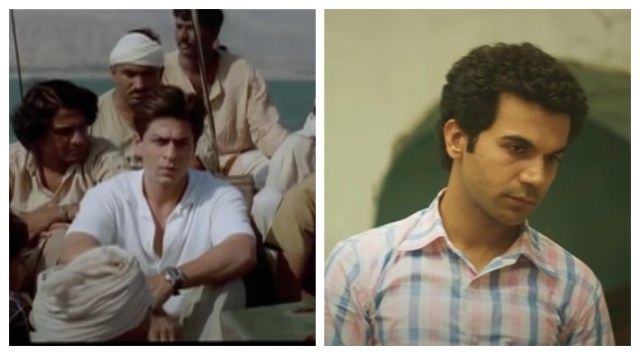Click here to follow Screen Digital on YouTube and stay updated with the latest from the world of cinema.
From Shah Rukh Khan’s Swades to Rajkummar Rao’s Newton, Bollywood films that have represented the essence of Indian Constitution
As India celebrates its 74th Republic Day, here's looking at some films which have cinematically presented the essence of our Constitution.
 Actors Shah Rukh Khan and Rajkummar Rao from the films Swades and Newton.
Actors Shah Rukh Khan and Rajkummar Rao from the films Swades and Newton. ‘We, the people of India…’
So begins the Preamble of the Indian Constitution, ensuring inclusivity and the very tenets of what makes us one country in its very opening words. Cinema, by its very definition, reflects the same beliefs and mores, aiming to not just entertain you, but to leave you a better person, when you walk out of theatres.
The Preamble talks about India being a Democracy, Republic, Secular, Socialist and built on Equality, Liberty, Justice, Sovereignty and Liberty, marking these as the key elements to lead a just and peaceful life within the system. As we celebrate our 74th Republic Day, here’s putting the spotlight on films which have been true to its primary function and the values espoused by the Constitution.
Newton
From the jungles of Chhattisgarh, Amit V Masurkar tells the story of India’s dance of democracy and its republic ideals, of a righteous man and a rigid system, of freedom and oppression. The Rajkummar Rao-Pankaj Tripathi starrer is based on a government servant who is sent to a politically sensitive area–controlled by Naxals–on election duty. The sharply written and gloriously performed dark comedy turns its lens towards the state of the world’s largest democracy and critiques it. It is as sensitive as its funny, as crushing as hopeful. What does it mean to be a citizen? Who makes for a good citizen? Can a bullish optimism lead to the win of democracy? What does it mean to vote?
Swades
Mohan Bhargava, played by Shah Rukh Khan is an Indian, living in the US and working for NASA. A reality check awaits him back at home, as he reaches a village that is yet to get electricity. While initially Mohan struggles to relate and accept the society he belongs to, his eventual change of heart becomes an evolutionary moments for the villagers. Leaving the comfortable live built for himself in a foreign land, the main character becomes part of the society to help it grow. Director Ashutosh Gowariker’s 2004 masterpiece is what socialism is about.
Aligarh
To be able to live freely, with the Constitutional rights intact, is what defines liberty for everyone. Manoj Bajpayee and Rajkummar Rao starrer Aligarh is inspired by true events where a professor is discriminated against for his sexual orientation. The 2015 film asked the right questions and left an impact on minds of the viewers.
Rang De Basanti
One of the most memorable works of director Rakeysh Omprakash Mehra, Rang De Basanti juxtaposes the freedom struggle with life in modern day India, as it boldly asks what makes a country great. Far from the chest-thumping patriotism we see in films today, the work is far more reflective and inward looking. It also questions corruption in the government, a youth that has lost its way and religious divide in India. The film’s relevance 20 years after its release also shows the relevance of its message — a country is as great as its people.
Pink
The road to justice is never easy. Another Taapsee Pannu film on the list, Pink told the story of three women, who take on the hard battle to not only demand justice but also regain their integrity. Directed by Aniruddha Roy Chowdhury, the 2016 film had Amitabh Bachchan essay the role of a retired lawyer Deepak Sehgal, who takes on a few ‘rich brats’ accused of sexual harassment. While the court proceeding was one of the most powerful and realistic ones in films, it also gave a very important lesson to the audience — the power of the word ‘No’.
“Na sirf ek shabd nahi… apne aap mein ek poora vakya hai… na ka matlab na hi hota hai. No means no,” Bachchan angrily says in the film. The societal belief that a woman’s no is just a yes in disguise, or that they are always ready for sex, is broken powerfully by the film. In a country, where marital rape is still an alarming issue, thanks to Pink, many women have found the strength to say no.
My Brother Nikhil and Mulk
Two different movies, set in two different worlds, mood and communities share–and eventually shake off– the burden of stigma. Filmmaker Onir’s acclaimed My Brother Nikhil and Anubhav Sinha’s powerful drama Mulk talk about what it means to be treated unequal, being looked at with a bias and go against a society that’s bent on keeping them on the fringes. Onir’s Goa-set feature followed the story of a gay man, who is forcibly quarantined after he contracts HIV. Onir captured the feeling of social isolation, homophobia and stigma to deliver a commentary that was as crushing as pertinent.
Far away from the sunshine of Goa, is Sinha’s Mulk, which placed its viewers right in the middle of a Muslim family’s ordeal in Uttar Pradesh. Theirs is a fight to win back their lost glory after their patriarch is accused of terrorism. The friendly neighbours move away, trust starts to fade, fingers are pointed and at one point in the family, even their house vandalised. Both, Mulk and My Brother Nikhil examine and critique the society, where a minority group fights for basics: the right to live a dignified life, the pursuit of equality.
Sarfarosh
Cinema is a mirror to society and over the years, Indian cinema has managed to evoke the many moods of patriotism through its film. Aamir Khan’s Sarfarosh not only gave a grim image of how art is affected by politics but also gave a lesson or two in secularism.
One of the most important characters in the film, Inspector Saleem doesn’t bat an eyelid while telling his seniors off. Knowing how amid the Pakistan-led terrorism Muslims were put under a scanner, he goes out and claims that the country is as much his, as his Hindu senior officer. Towards the end, as he breathes his last, fighting for his country, he leaves behind his powerful words that keep ringing, long after you’ve left the theatre.
Chak De India!
13 hockey players from 13 different states come together to play for the National women’s team. As they introduce themselves to coach Kabir Khan, their dependency of the identity given to them by their states defines them and that is where Kabir, a Muslim, middle-aged man, played by Shah Rukh Khan, teaches the meaning of sovereignty. Director Shimit Amin’s masterpiece Chak De India! was not just about Shah Rukh Khan in a different avatar but also about how dependency of the state can become bigger than the nation’s identity for many people.


- 01
- 02
- 03
- 04
- 05
































